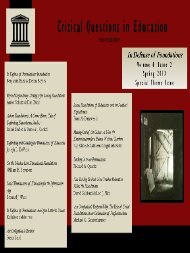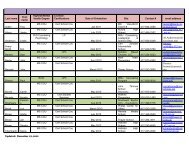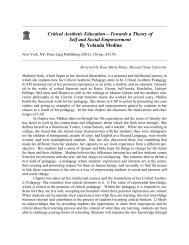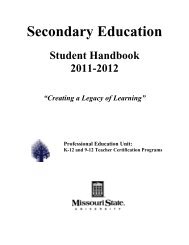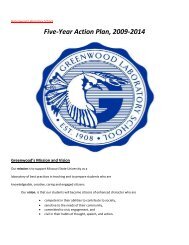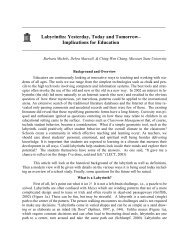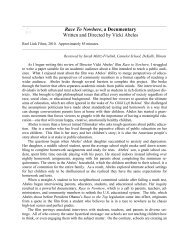An Obligation to Endure - College of Education
An Obligation to Endure - College of Education
An Obligation to Endure - College of Education
Create successful ePaper yourself
Turn your PDF publications into a flip-book with our unique Google optimized e-Paper software.
Critical Questions in <strong>Education</strong> (Special Issue) Volume 4:2 143<br />
government in which they had little or no voice. In 1938, Woolf recommended that they think <strong>of</strong><br />
themselves as a disorganized “Society <strong>of</strong> Outsiders” transforming those oppressive teachers in<strong>to</strong><br />
a nonviolent ethic that involves pursuit <strong>of</strong> modest means for simple living, refusal <strong>to</strong> commit<br />
“adultery <strong>of</strong> the brain,” commitment <strong>to</strong> work in obscurity, and enactment <strong>of</strong> “freedom from unreal<br />
loyalties.” 76<br />
Similarly, seventy-five years later, I propose that educational foundations scholars can<br />
best fulfill our present obligation <strong>to</strong> endure these two radically challenging climate changes by<br />
heeding gardeners’ instructive caveat: “Shallow root systems will not survive the drought.” That<br />
is, we need <strong>to</strong> preserve, sustain, and develop our field’s ancient roots in intellectual cultures<br />
worldwide with particular attention <strong>to</strong> their diversity—no matter what our location may be—<br />
while adopting the courageous ethical standpoint <strong>of</strong> Outsiders <strong>to</strong> the market society:<br />
(1) pursuing our urgent inquiries and educational projects for social and ecological justice<br />
as resourcefully as we can, even if under-funded or not funded at all, aware that gifts <strong>of</strong> time for<br />
interpretive, critical, and normative contemplation on education may be the most vital currency<br />
for our timely purposes in this climate-changing era;<br />
(2) seeking and accepting only those institutional and fiscal supports that cannot undermine<br />
our moral concerns about this era’s reconfiguring educational aims, practices, and policies<br />
and their likely effects upon both GCC and ECC;<br />
(3) seeking no gain or glory from assessments <strong>of</strong> our work’s market value, content instead<br />
<strong>to</strong> witness, document, interpret, critique, and learn from meaningful educational movements,<br />
small and large, <strong>to</strong>ward social and ecological justice, especially among those who do value<br />
such moral ends; and,<br />
(4) working deliberately with various partners in arts and humanities and among local<br />
communities <strong>of</strong> the oppressed <strong>to</strong> create anomalous new cultural spaces strategically located both<br />
inside and outside schools, universities, and various other educational institutions—as the women’s<br />
and gender studies movement has done so brilliantly—spaces that can foster vital learning<br />
and foundational inquiry while strategically resisting and minimizing their climate-damaging<br />
commodification by the market society.<br />
Such re-framing <strong>of</strong> educational foundations, wide-awake <strong>to</strong> both GCC and ECC wrought<br />
by the market society, implies the field’s necessary reconfiguration <strong>to</strong>ward a future conscientiously<br />
intent upon our obligation <strong>to</strong> endure. That future is a <strong>to</strong>pic for another occasion. But institutions<br />
whose leaders share educational foundations scholars’ moral concerns related <strong>to</strong> that<br />
obligation will hear our field’s self-defense, exert themselves <strong>to</strong> help us protect our work as Outsiders<br />
from deleterious market-driven impacts, and welcome chances <strong>to</strong> learn from our inquiries<br />
about education’s his<strong>to</strong>rical, conceptual, cultural, and practical reconfiguration for better and for<br />
worse. But, no matter how smart our scholarly self-defense in special issues like this may be,<br />
such effort will be wasted on those educational institutions whose leaders lose no sleep over<br />
moral sacrifices that the market society is demanding from them—at the expense <strong>of</strong> both the<br />
global climate and the educational climate, upon which depend our planet’s and our democracy’s<br />
powers <strong>to</strong> endure.<br />
76. Virginia Woolf, Three Guineas (San Francisco: Harcourt, 1938), especially 109 ff.



